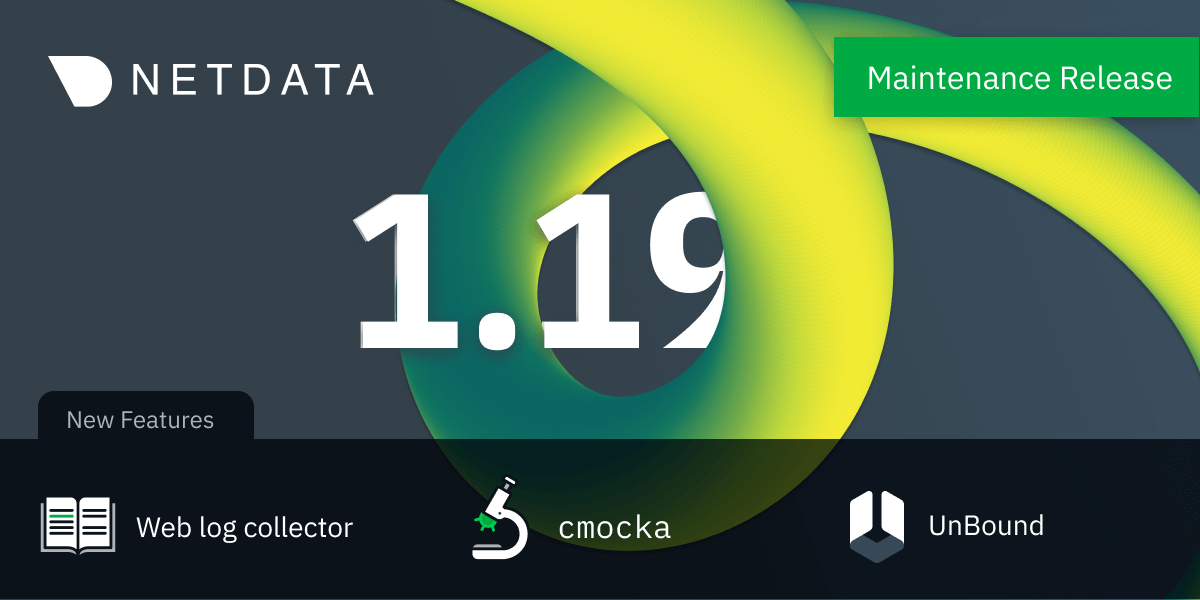
Network monitoring is complex, which is why we’re developing a monitoring tool that will drastically increase DevOps productivity. This release is all about improving Netdata’s day-in, day-out performance. We’re working hard to make deploy enhancements that help engineers make faster, smarter decisions about their systems.
v1.19 of Netdata delivers a vastly improved way to collect, parse, and understand the health and performance of any service or application that runs through an Apache or Nginx web server.
And, perhaps more importantly, this improvement lands us one step closer to a generic application log parser for Netdata.
Web log parsing comes on top of 19 bug fixes, 17 improvements, and 18 documentation updates. Let’s jump in.
Go-based web log parsing
We completed a major rewrite of our web log collector to improve its flexibility and performance dramatically. The new collector, written entirely in Go, can parse and chart logs from Nginx and Apache web servers, and contains numerous improvements.Netdata now supports the LTSV log format, creates charts for TLS and cipher usage, and is amazingly fast. In a test using SSD storage, it parsed the logs for 200,000 requests in about 200ms, using 30% of a single core. We want to do more performance testing in real-world environments, but the initial results are promising.
This Go-based collector also has powerful custom log parsing capabilities, which means we’re one step closer to a generic application log parser for Netdata. We’re continuing to work on this parser to support more application log parsing in the future.
We have a new tutorial on enabling the Go web log collector and using it with Nginx and/or Apache access logs with minimal configuration.
Thanks to Wing924 for starting the Go rewrite!
Introducing cmocka testing for Netdata’s agent
In this release, we’ve done lots of unit testing work on top of the project that began in v1.18. We’re testing how Netdata’s internal web server processes HTTP requests—the first step to improve the quality of code throughout the entire Netdata project, reduce bugs, and make refactoring easier.We chose cmocka because it supports our pure C codebase, is easy enough to use, and doesn’t have external dependencies.
But, as you might have expected, building a responsive and powerful unit testing framework didn’t come that easy. To efficiently test thousands of separate cases, we’d have to write thousands of unique tests. Instead, we build a layer on top of cmocka to use parametric unit tests, which give us the best of all worlds.
With this new framework in place, we began to test how the internal web API responds to some rather unique situations. As we continue to apply unit testing across our code base, we’ll create a more robust, bug-free monitoring agent for your systems.
Read all about our process of testing and selecting cmocka on our blog post: Building an agile team’s ‘safety harness’ with cmocka and FOSS.
Better, faster metrics for Unbound DNS servers
Netdata’s Unbound collector was also completely rewritten in Go to improve how it collects and displays metrics. This new version can get dozens of metrics, including details on queries, cache, uptime, and even show per-thread metrics.We relied heavily on our community for this rewrite, with their valuable suggestions driving how our engineers prioritized and worked on this collector.
Want to monitor your Unbound server in about 10 minutes? See our new tutorial on enabling the new collector via Netdata’s amazing auto-detection feature.
What else?
We fixed an error where invalid spikes appeared on certain charts by improving the incremental counter reset/wraparound detection algorithm.Netdata can now send health alarm notifications to IRC channels thanks to Strykar!
And, Netdata can now monitor AM2320 sensors, thanks to hard work from Tom Buck.
We have a ton of people to thank, so be sure to check out the full release notes on GitHub.
